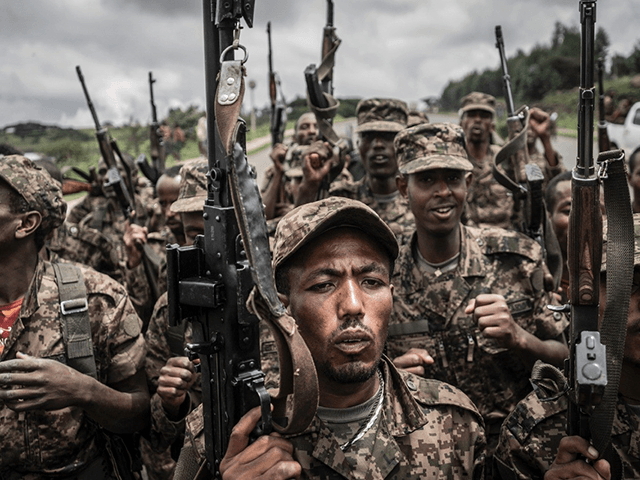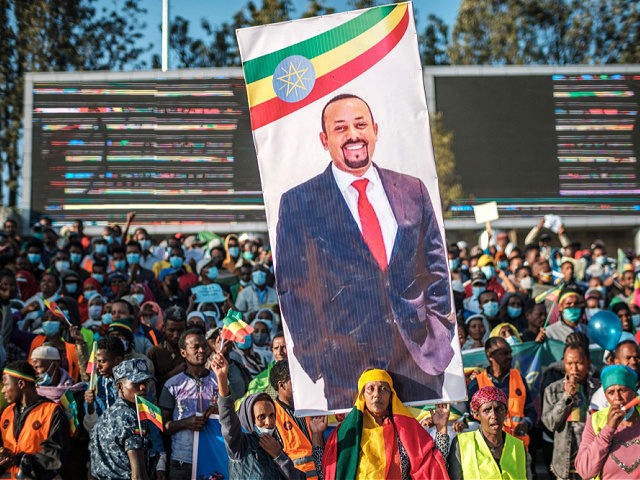Ethiopian Prime Minister Abiy Ahmed, recipient of the Nobel Peace Prize in 2019, announced on Monday he will head for the front lines of battle and take direct command of his troops to fight the Tigrayan insurrection.
“It’s time to lead the country through sacrifice. I will join the front to lead the defense forces tomorrow. Those of you who aspire to be remembered in history, rise up for your country. Meet me at the front,” Abiy said from the capital of Addis Ababa.
Abiy said his government faces both “internal and external enemies,” who are “determined to build up themselves on the ruins of Ethiopia.”
“It is a plot to repress Ethiopia, shatter the spirit of black people and reimpose neo-colonialism. This struggle is the struggle of all black people,” he claimed, invoking the spirit of pan-Africanism to rally other nations to his cause.
Abiy’s statement suggested recent advances by rebel forces could imperil the national capital, so he felt it was necessary to leave his administrative duties to others and take to the front lines in “the final moment of the battle for Ethiopia’s existence.”

Soldiers from the Ethiopian National Defence Forces pictured during training in Amhara on September 14, 2021. (Amanuel Sileshi/AFP)
“Ethiopia’s thousands of years of freedom and sovereignty was not gained by charity. Ethiopia’s name of freedom is paid for by blood and many Ethiopian heroes have paid for it,” he said.
The Tigrayan People’s Liberation Front (TPLF) claimed on Saturday to have captured two key towns, one of them located within 135 miles of Addis Ababa.
The town of Shewa Robit was defended by an ethnic militia from the Amhara tribe, while the Tigrayans are allied with another tribal secessionist group, the Oromo Liberation Front (OLF) or Oromo Liberation Army (OLA).
Shewa Robit’s defenders complained they received little support from Abiy’s military, the Ethiopian National Defense Force (ENDF). Amhara fighters said the ENDF has apparently ceded their entire tribal region to the advancing TPLF-OLF alliance.
Defense Minister Abraham Belay said after a meeting of Abiy’s Prosperity Party on Monday that a change of tactics would be forthcoming.
“We can’t continue like this, that means there will be change,” said Belay, alluding to the latest TPLF conquests. “What happened and is happening to our people, the abuses being meted out by this destructive, terrorist, robber group, can’t continue.”
AFP noted that while other government officials sought to downplay the TPLF’s gains, they did not respond to questions about the TPLF capturing Shewa Robit.
Ethiopian strategic analysts warned last week that if the TPLF-OLF could capture and hold Shewa Robit, they would be able to open a new front in their drive toward Addis Ababa, potentially bypassing unexpected stiff resistance from Amhara militia units and drawing still more ethnic militias into the battle as some long-simmering tribal conflicts erupt.
International analysts are also deeply concerned that destabilization could rapidly spread beyond Ethiopia’s borders if Abiy falls, most disturbingly to Somalia, which has long relied on Ethiopian assistance to combat the al-Shabaab terrorist organization.

Soldiers of Tigray Defence Force (TDF) prepare to leave for another field at Tigray Martyr’s Memorial Monument Center in Mekele, the capital of Tigray region, Ethiopia, on June 30, 2021. (Yasuyoshi Chiba/AFP via Getty Images)
The TPLF was not much impressed by Abiy’s announcement he would head to the front lines and take personal command of his troops.
“I would’ve dismissed this as yet another sick joke any day,” sneered senior TPLF official Getachew K. Reda.
Reda said Abiy’s fantasies about joining Ethiopia’s glorious warrior-emperors of old have “taken on an all-too-palpable schizophrenic overtone.”
“Our forces won’t relent on their inexorable advance towards bringing his chokehold on our people to an end. We will coordinate our efforts with other like-minded groups to send these child killers to the jailhouses they belong,” Reda vowed.
A U.S. military official told CNN on Monday that U.S. Army Rangers have been positioned in Djibouti and are ready to protect American embassy staffers in Addis Ababa if necessary. The source said three U.S. amphibious warships in the Middle East are also on standby alert to support evacuations.
“There are no plans to fly the U.S. military into Ethiopia to facilitate evacuations or replicate the contingency effort we recently undertook in Afghanistan, which was a unique situation for many reasons,” a State Department official insisted on Monday.
“We are always, of course engaged in contingency planning for hypotheticals, but again, with the airports wide open, there’s no reason for that at all,” the official added.

COMMENTS
Please let us know if you're having issues with commenting.